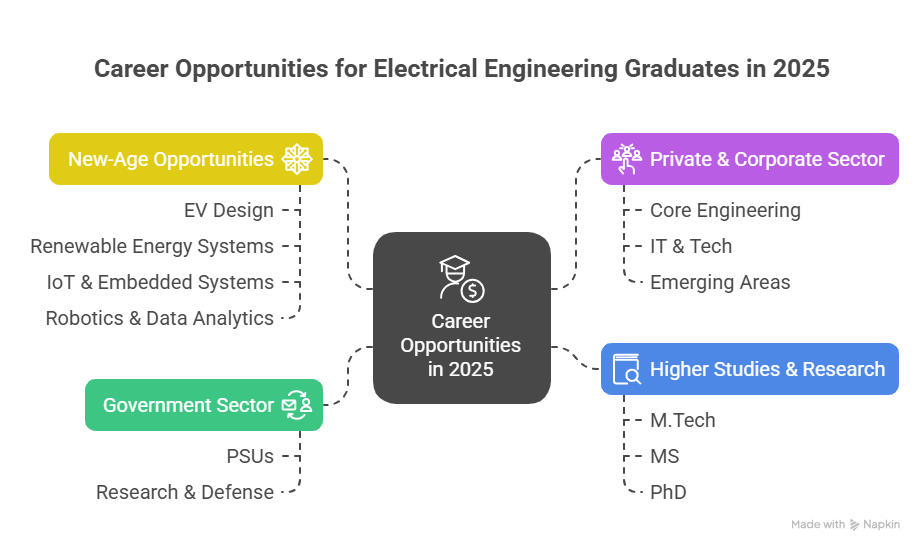Introduction
Electrical engineering continues to be a driving force behind India’s technological progress, from power grids and automation to smart electronics and green energy. In 2025, choosing B Tech Electrical Engineering from a top private BTech college in India offers unmatched opportunities for innovation, industry engagement, and career growth.
Skills Developed in B.Tech Electrical Engineering
The EEE program at IIMT focuses on both core technical skills and professional competencies:
-
Problem-Solving & Innovation: Using electrical engineering principles to solve industry challenges.
-
Technical Skills: Proficiency in power systems, circuit design, digital logic, microcontrollers, embedded systems, and electrical safety.
-
Software Proficiency: Application of design and simulation tools (MATLAB, AutoCAD), programming for automation and data logging.
-
Project Management: Planning, executing, and reviewing technical projects in multidisciplinary teams.
-
Communication & Leadership: Technical writing, presentation, effective teamwork and ethical decision-making.
Career Scope & Opportunities in 2025
Electrical engineering graduates are in high demand across diverse sectors, both traditional and emerging :
Government Sector
-
PSUs: NTPC, BHEL, Power Grid, ONGC, Indian Railways, State electricity boards (via GATE, SSC, campus placement).
-
Research & Defense: DRDO, ISRO, C-DAC, and other central agencies.
Private & Corporate Sector
-
Core Engineering: Energy companies, microprocessor design, control panel manufacturing, automation, electronics, and automotive.
-
IT & Tech: Embedded systems, IoT, VLSI chip design, software development, industrial automation, robotics.
-
Emerging Areas: Renewable energy (solar, wind), EV design, smart grids, and green tech startups.
New-Age Opportunities
-
EV (Electric Vehicle) Design: As India pivots to e-mobility, B.Tech graduates are highly sought for battery systems, charging infrastructure, and vehicle electronics.
-
Renewable Energy Systems: Solar, wind, and smart grid innovations demand modern electrical engineers.
-
IoT & Embedded Systems: Tech-driven electrical engineers find lucrative careers in chip design, automation, and digital systems.
-
Robotics & Data Analytics: Automation, AI, and integration for Industry 4.0 are expanding job roles.
Higher Studies & Research
Graduates may pursue M.Tech, MS, or research in power electronics, smart systems, control engineering, or interdisciplinary studies. Academic careers and PhD programs are accessible in top universities in India for engineering.

About IIMT University’s B.Tech Electrical Engineering Program
IIMT University in Meerut offers a modern, industry-aligned B.Tech in Electrical and Electronics Engineering (EEE) designed to address the evolving needs of the power, automation, and electronics sectors. The 4-year program blends rigorous theory and extensive hands-on training, covering fundamental concepts and advanced specializations like digital systems, control engineering, renewable energy, and signal processing.
Key Features & Curriculum
-
Course Duration: 4 years (8 semesters), full-time UG program.
-
Specializations: Power systems, electrical machines, digital electronics, control & automation, microprocessors, renewable energy, embedded systems, and more.
-
Learning Approach: Project-based labs, industry internships, simulation software, real-world assignments, and active research culture.
Fees & Admission
-
Tuition Fees: Approx. ₹2.3 lakh (full course); hostel and other charges extra.
-
Admission Criteria: Merit-based plus entrance exam (CUET UG/JEE Main); eligibility—10+2 PCM (Physics, Chemistry, Mathematics) with specified minimum marks.
-
Admission Timeline: Applications begin after Class 12 results; CUET/JEE Main and university-specific tests accepted; registration fee is ₹2,000.
Why Choose IIMT University for B Tech Electrical Engineering?
-
UGC Recognised University: Accredited programs meeting national education quality standards.
-
Industry-Driven Curriculum: Modern syllabus, cutting-edge labs, simulation, and internships ensure practical expertise.
-
Affordable Fees & Value: Lower tuition compared to metropolitan private colleges, strong ROI for skill and salary growth.
-
Placement Cell & Alumni Network: Decade-long industry ties help students achieve placements in core and allied sectors.
-
Campus Life & Global Exposure: Extracurriculars, student activities, and conferences to build communication and leadership.
FAQs
Q1. What is the average fee and placement for B Tech Electrical at IIMT?
₹2.3 lakh tuition; placements average ₹6 LPA, with top students getting ₹10 LPA.
Q2. Which industries hire electrical engineers in 2025?
Energy, EV, automation, software, manufacturing, telecom, government PSUs, and green startups.
Q3. Why is IIMT a top choice for B Tech electrical?
It’s a UGC recognised university offering modern course content, affordable fees, hands-on training, and strong placement support.
Conclusion
Choosing B Tech Electrical Engineering in 2025 is a gateway to impactful careers, technical leadership, and sustainable innovation. As a UGC recognised university, IIMT University equips aspirants with the professional skills, industry exposure, and future-ready expertise needed to thrive. Explore admissions today for a bright future in engineering.





